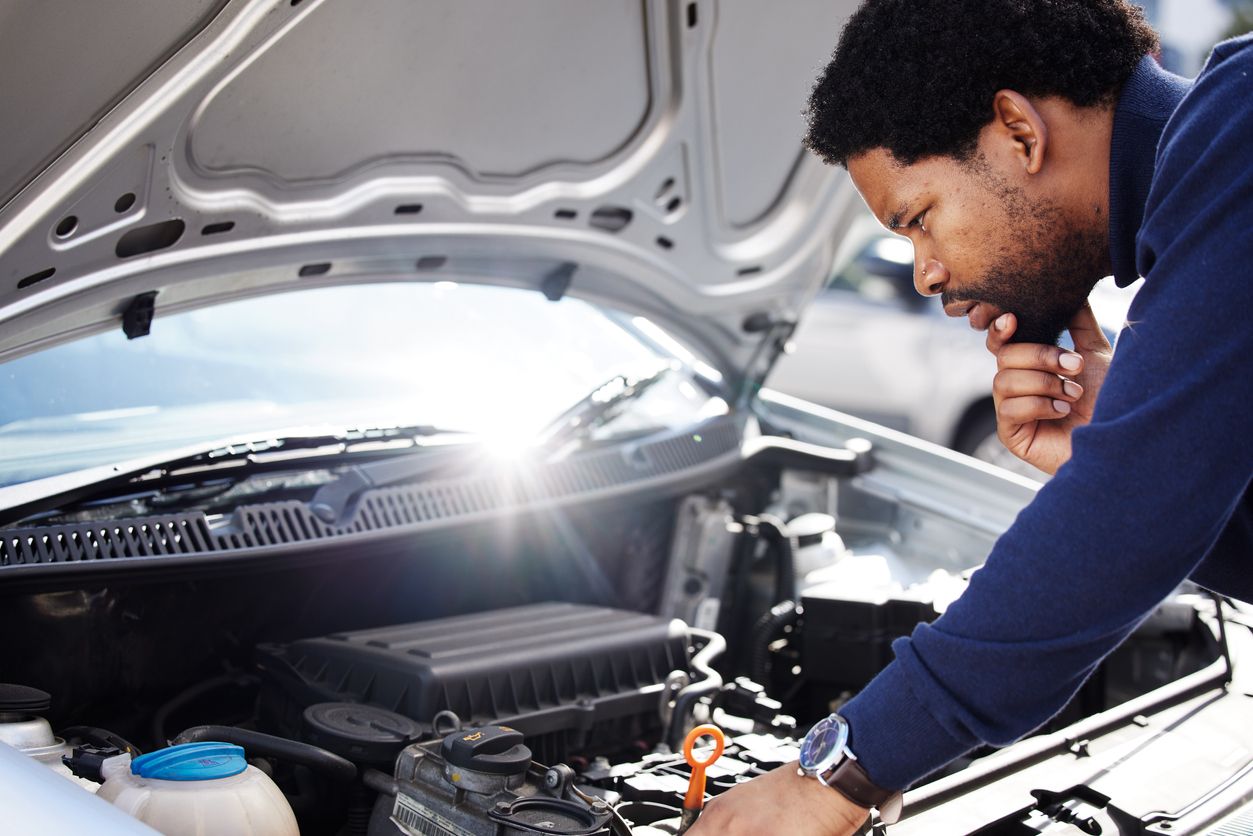Engine knock can frustrate even the most experienced drivers. It signals potential issues within your engine that need attention.
This blog post will delve into the causes and fixes of engine knock. Understanding these will help you maintain your car’s performance and longevity. Engine knock, also known as pinging or detonation, occurs when fuel burns unevenly in your engine’s cylinders.
This uneven combustion can lead to serious damage over time. Common causes include low-quality fuel, incorrect spark plugs, or a faulty knock sensor. Knowing these causes helps in identifying the right fix. Fixes can range from simple solutions, like using higher-octane fuel, to more complex repairs, like replacing damaged engine parts. We’ll guide you through the common causes and effective fixes to keep your engine running smoothly.
Introduction To Engine Knock
Engine knock, a common problem in vehicles, occurs when fuel burns unevenly in the engine’s cylinders. This issue can be caused by poor fuel quality, incorrect spark timing, or carbon buildup. Fixes include using higher octane fuel, cleaning the engine, or adjusting the spark plugs.
Engine knock, or knocking, is a common issue in vehicles. It can affect both new and old engines. Understanding its causes and fixes can save money and keep your car running smoothly. This blog post will help you learn about engine knock.What Is Engine Knock?
Engine knock happens when fuel burns unevenly in engine cylinders. It creates a knocking or pinging noise. This noise indicates a problem in the combustion process. Normal combustion burns fuel smoothly, while knocking causes small explosions. These explosions can damage engine parts over time.Why It Matters
Engine knock can lead to serious engine damage. It may affect your car’s performance. It also reduces fuel efficiency. Ignoring engine knock can lead to costly repairs. Fixing it early can save you money. It can also extend the life of your engine. Regular maintenance helps prevent engine knock. Checking your car’s health is crucial. “`
Credit: www.youtube.com
Common Causes Of Engine Knock
Engine knock can be a frustrating issue for many car owners. It often signals a deeper problem within the engine. Understanding the common causes can help you address the issue effectively.
Low Octane Fuel
Using low octane fuel can lead to engine knock. Lower octane fuel burns quicker than higher octane fuel. This quick burn can cause pre-ignition, leading to knocking sounds. To prevent this, use the fuel grade recommended by your vehicle’s manufacturer.
Carbon Deposits
Carbon deposits form on the combustion chamber walls over time. These deposits can increase the compression ratio. High compression can cause the fuel to ignite prematurely. This results in the knocking sound. Regular engine cleaning can help reduce carbon buildup.
Incorrect Spark Plugs
Spark plugs play a key role in engine performance. Using incorrect spark plugs can cause engine knock. Spark plugs must match the engine specifications. The wrong type can cause improper fuel ignition. Ensure you use the correct spark plugs for your vehicle.
Symptoms Of Engine Knock
Understanding the symptoms of engine knock can help you identify and fix the problem early. Recognizing these symptoms will save you from costly repairs and ensure your vehicle runs smoothly. Below, we’ll delve into the key symptoms.
Noise Characteristics
Engine knock often produces a distinct noise. It sounds like a metallic ping or tapping. This noise usually comes from the engine block. It gets louder when you accelerate. Listen carefully when you start your car. A persistent knocking sound is a clear indicator.
Performance Issues
Engine knock affects your car’s performance. You may notice a decrease in power. The car might struggle to accelerate. Fuel efficiency can also drop. Check your fuel consumption. Poor fuel economy is a common symptom.
Here is a quick comparison of normal performance vs. performance with engine knock:
| Normal Performance | With Engine Knock |
|---|---|
| Smooth acceleration | Struggles to accelerate |
| Optimal fuel efficiency | Poor fuel economy |
| Quiet engine operation | Knocking noise |
Addressing these symptoms early can prevent further damage. Regular maintenance is key to a healthy engine.

Credit: atldiesel.com
Diagnosing Engine Knock
Engine knock can be a worrying sound. It may signal serious engine issues. Diagnosing the cause is crucial. Accurate diagnosis helps in finding the right fix. This section covers how to diagnose engine knock effectively.
Diagnostic Tools
Using the right tools is vital for diagnosing engine knock. Here are some essential tools you will need:
- OBD-II Scanner: This tool reads error codes from the engine control unit. It helps identify issues related to the knock sensor and other components.
- Stethoscope: An automotive stethoscope helps pinpoint the exact source of the knock. It amplifies the sound so you can listen carefully to different engine parts.
- Compression Tester: This tool measures the compression levels in each cylinder. Low compression can indicate problems like worn piston rings or damaged cylinders.
- Timing Light: A timing light checks the ignition timing. Incorrect timing can cause knocking sounds.
Visual Inspection
A visual inspection can reveal obvious signs of engine problems. Here are key areas to inspect:
| Component | What to Look For |
|---|---|
| Spark Plugs | Check for wear, fouling, or damage. Replace if needed. |
| Belts and Hoses | Look for cracks, frays, or wear. Replace damaged parts. |
| Engine Oil | Inspect the oil level and quality. Dirty oil can cause knocking. |
| Cooling System | Check for leaks or coolant level. Overheating can lead to knock. |
Conducting a thorough visual inspection can help you spot potential issues early. This can save time and money on repairs.
Preventive Measures
Preventing engine knock can save you from costly repairs. Simple steps help keep your engine running smoothly.
Using High-quality Fuel
Using high-quality fuel is crucial. Low-quality fuel can cause deposits in the engine. These deposits lead to knocking. High-quality fuel burns cleaner. It reduces the chance of deposits forming.
Regular Maintenance
Regular maintenance keeps your engine in good shape. Change the oil as recommended. Clean the fuel injectors. Inspect the spark plugs. Replace them if worn out. These steps help prevent engine knock.
Fixing Low Octane Fuel Issues
Low octane fuel can cause engine knock. This can harm your car’s engine. Fixing this issue is crucial for your vehicle’s health. Let’s explore effective solutions.
Switching To High Octane Fuel
One simple fix is switching to high octane fuel. High octane fuel burns more efficiently. This reduces engine knock. Check your vehicle’s manual for the recommended octane level. Use the suggested octane rating for better performance. High octane fuel may cost more. Yet, it protects your engine from damage.
Fuel Additives
Fuel additives can help with low octane fuel issues. These products increase the fuel’s octane level. They improve combustion and reduce knocking. Follow the instructions on the additive’s label. It’s easy and effective. Regular use of fuel additives can keep your engine running smoothly. They are a good investment for long-term engine health.
Removing Carbon Deposits
One common cause of engine knock is the buildup of carbon deposits. These deposits can disrupt the combustion process, leading to inefficient fuel burning and knocking sounds. Removing these carbon deposits can restore your engine’s performance and eliminate the knocking noise.
Engine Cleaning Solutions
Regular cleaning of your engine can help remove carbon deposits. There are various engine cleaning solutions available in the market. These solutions are designed to break down and dissolve carbon deposits inside the engine.
Here are some effective engine cleaning solutions:
- Fuel Additives: These are added to the fuel tank to clean the fuel system.
- Intake System Cleaners: These are sprayed into the intake manifold to clean the intake valves.
- Combustion Chamber Cleaners: These are designed to clean the combustion chamber and piston tops.
Professional Cleaning Services
For severe carbon buildup, professional cleaning services are recommended. These services use specialized tools and techniques to clean the engine thoroughly.
Here’s what professional cleaning typically includes:
- Inspection: Technicians inspect the engine for carbon buildup.
- Disassembly: The engine is partially disassembled to access affected areas.
- Cleaning: High-pressure cleaning tools and chemical solutions are used.
- Reassembly: The engine is reassembled and tested.
| Cleaning Method | Description |
|---|---|
| Fuel Additives | Added to the fuel tank to clean the system. |
| Intake System Cleaners | Sprayed into the intake manifold to clean valves. |
| Combustion Chamber Cleaners | Cleans the combustion chamber and piston tops. |
Correcting Spark Plug Issues
Engine knocking can be a serious issue. Incorrect spark plugs often cause this problem. Addressing spark plug issues can reduce or eliminate engine knock. This section explores how to choose and install the right spark plugs.
Choosing The Right Spark Plugs
Not all spark plugs are the same. Different engines need different types. Check your vehicle’s manual. It will list the right spark plug type. Using the correct type ensures proper combustion. This reduces the chance of engine knock.
Consider the material. Copper, platinum, and iridium are common options. Each has its own benefits. Copper plugs are good for older vehicles. Platinum and iridium last longer. They work well in modern engines.
Proper Installation Techniques
Installing spark plugs correctly is crucial. An incorrect installation can cause engine knock. First, make sure the engine is cool. This avoids burns and ensures better installation. Use a spark plug socket for removal and installation.
Check the gap between the electrodes. This gap must match the manufacturer’s specifications. Use a gap tool for adjustments. Screw the spark plug in by hand first. This avoids cross-threading. Then tighten with a torque wrench. Over-tightening can damage the threads.
Double-check your work. Make sure all plugs are secure. Start the engine and listen. If the knock is gone, you have fixed the issue. If not, there may be other problems to address.
When To Consult A Mechanic
Engine knock can be a troubling sound. Sometimes, it’s an easy fix, but other times, it signals a bigger issue. Knowing when to consult a mechanic can save you time and money.
Persistent Engine Knock
If the engine knock persists despite your efforts, it’s time to seek professional help. A persistent knock can indicate deeper problems that require specialized tools and expertise.
Ignoring a persistent engine knock can lead to more damage. It’s important to address the issue early to avoid costly repairs.
Complex Repairs
Some repairs are beyond the scope of a DIY fix. Issues like worn bearings, damaged pistons, or a misaligned crankshaft require a mechanic’s touch.
In these cases, a trained professional can diagnose the problem accurately. They have the necessary equipment and experience to fix complex issues.
| Symptom | Possible Issue |
|---|---|
| Persistent Knock | Worn Bearings |
| Loud, Irregular Noise | Damaged Pistons |
| Vibration and Noise | Misaligned Crankshaft |
Understanding these signs can help you decide when to consult a mechanic. Regular maintenance and early intervention are key to keeping your engine running smoothly.

Credit: www.tiresplus.com
Frequently Asked Questions
What Causes Engine Knock?
Engine knock is caused by fuel burning unevenly in the engine cylinders. This creates a knocking noise.
How Can I Fix Engine Knock?
To fix engine knock, use higher-octane fuel, check spark plugs, and clean carbon deposits.
Is Engine Knock Dangerous?
Yes, engine knock can damage engine parts over time if not addressed promptly.
Can Low-quality Fuel Cause Engine Knock?
Yes, low-quality fuel can lead to incomplete combustion, causing engine knock.
How Do I Prevent Engine Knock?
Regular maintenance, using high-quality fuel, and timely spark plug replacement can help prevent engine knock.
Conclusion
Fixing engine knock is essential for your car’s health. Identify the causes early. Use the right fuel. Check spark plugs and timing. Regular maintenance helps. Addressing these issues saves money. Keeps your engine running smoothly. Don’t ignore the warning signs.
Act promptly. Your car will thank you. Enjoy safer and more efficient drives. Happy driving!

















